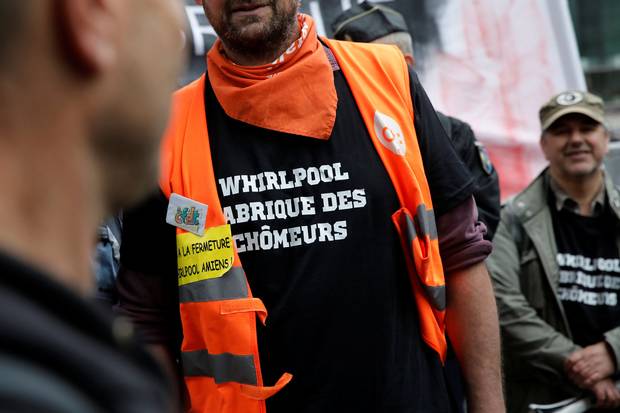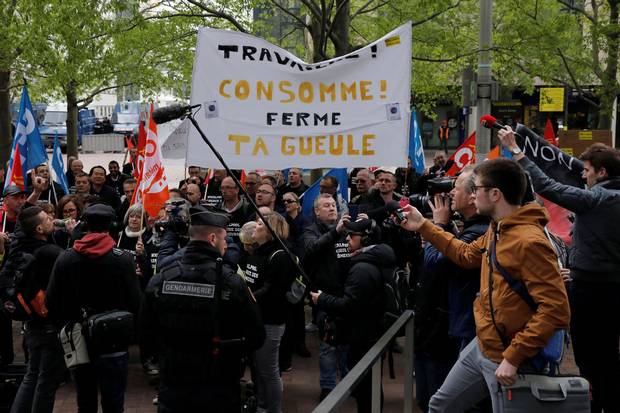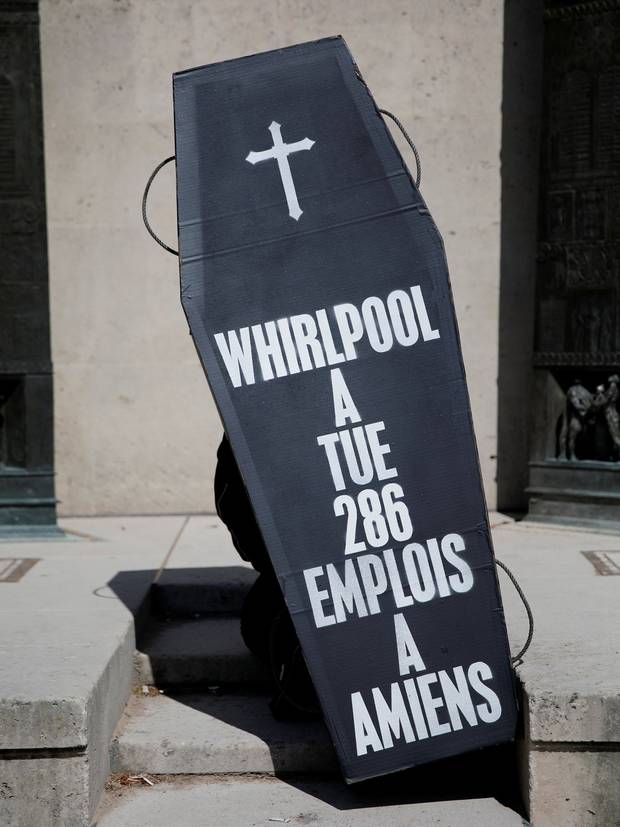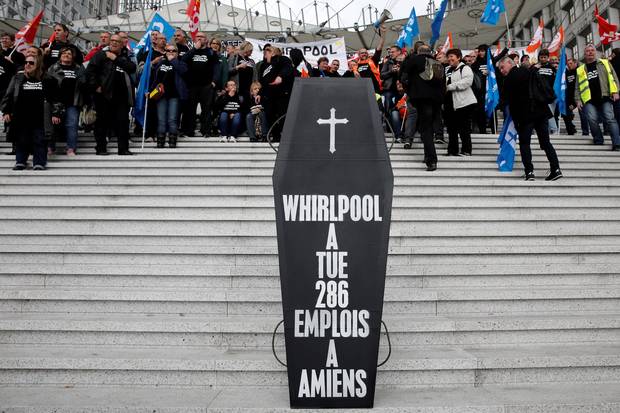The industrial site now occupied here by Whirlpool, the American home-appliances maker, has been a remarkable survivor.
Its 17 hectares of factory buildings and loading docks on the River Somme in Amiens, in northeast France, began life in 1910 as an agricultural-equipment factory. It somehow made it through the First World War, whose bloodiest battlefields lay not far away, the Great Depression and the Second World War, later transforming itself into a maker of clothes dryers.
But there was one foe it could not outmanoeuvre: globalization. On Jan. 24, Whirlpool announced that the factory would close in June of 2018. Its production line will be dismantled and transferred to Lodz, Poland – a massive logistical exercise that will require 900 truckloads of assembly-line equipment to make the 1,400-kilometre journey eastward.
"It was a shock to us," said François Gorlic, 50, who has worked at the factory for 23 years, essentially inheriting the job from his father, Paul, who toiled a solid three decades on the same line. In his final months at the factory, the younger Mr. Gorlic has taken to wearing a black-and-white T-shirt that bears an equally black-and-white message: "Whirlpool, the unemployment factory."

A Whirpool union employee sports a T-shirt accusing the company of manufacturing the unemployed.
BENOIT TESSIER/REUTERS
It is a sentiment reverberating far beyond the factory where Mr. Gorlic will soon be shown the door. Marine Le Pen, leader of the National Front (FN) – the hard-nationalist, anti-immigrant and anti-European Union party – has turned what she calls "the Whirlpool issue" into an all-out call for Donald Trump-style economic patriotism. On March 20, during the first TV candidates' debate in the run-up to the May 7 presidential election, Ms. Le Pen cited Whirlpool as the "best example" of how multinational companies are heartlessly transferring jobs to low-cost countries, leaving French workers "high and dry."
The cri de coeur of economic nationalism – Ms. Le Pen has called for a 35-per-cent tariff on products made abroad by Whirlpool and shipped to France – is translating into an uptick in voter support for the FN as France heads into the tightest election in decades, one that could turn France and the EU on their heads.
In the first round of voting, to take place Sunday, polls show that Ms. Le Pen is set to establish herself as far more than a fringe candidate defined by her xenophobia. Running at about 22 per cent, she is likely to come out either first or second – a showing that in turn will pave the way for her to make it into the second, and final, round of voting in two weeks' time.
There is no doubt that deindustrialization has lured its victims to embrace the candidates of the extreme parties, notably Ms. Le Pen and Jean-Luc Mélenchon, the Communist-backed euroskeptic who heads the Unsubmissive France party, and whose remarkable rise in recent weeks has put him among the top four contenders in the first round of the election.
An Ifop poll published Thursday in the French daily Libération revealed that 44 per cent of French "workers" (meaning industrial workers) intended to vote for Ms. Le Pen. Mr. Mélenchon's support among the same slice of the electorate was 17 per cent, identical to the support among such workers for the centrist En Marche candidate, Emmanuel Macron, who shares the first-round polling lead with Ms. Le Pen. Not surprisingly, François Fillon, the centre-right Republican candidate who is about tied with Mr. Mélenchon and who is calling for a Thatcherite restructuring of the French economy, has the support of only 7 per cent of workers.
Ms. Le Pen seems virtually certain to retain her lead – or something close to it – among the working class. The same poll found that 76 per cent of workers surveyed were "sure of their choice." Ms. Le Pen has also wired up the youth vote, it appears. A recent Ifop poll found that she and the FN were most popular among those in the 18-to-24 age group, with 39 per cent of that cohort, well ahead of Mr. Macron, with 21 per cent. Youth unemployment in France is approaching 25 per cent, up from 18 per cent in 2008.
In other words, if Ms. Le Pen is propelled to victory in the run-off, she can thank the workers who fear globalization and the young with no jobs or with miserable job prospects. Job destruction in France has served her well. "She is popular among the electorate who have lost hope and who blame the EU, the euro and globalization," said Grégory Claeys, economist at the Brussels think tank Bruegel.

Supporters wave French national flags as they cheer ahead of a Marine Le Pen rally in Paris on April 17, 2017.
JOEL SAGET/AFP/GETTY IMAGES
In fact, however, the French economy is stronger than Ms. Le Pen's supporters might guess.
It's true that, after coming through the 2008 financial crisis largely intact, France suffered greatly during the deep recession and the eurozone crisis of 2011 and 2012, which nearly saw Greece pushed out of the eurozone, and sent the debt loads of France, Italy and other struggling EU countries soaring.
But there is no doubt that the worst is over. The French economy grew by 1.2 per cent last year, and is expected to grow by 1.4 per cent in 2017. That's weaker than the growth in Germany or Britain – a weakness due, in part, to labour-market regulations in France that work to dissuade some companies from creating full-time positions. But at least the number is going in the right direction. Unemployment, at 9.9 per cent, is falling, albeit slowly; it was 10.4 per cent in 2015.
That said, the recovery has been uneven. Youth unemployment is not going down, and deindustrialization, especially in northern France, seems relentless, hitting towns, small cities and rural areas particularly hard. They have become breeding grounds for the extreme parties, with the FN sweeping up the most support, as Ms. Le Pen's anti-globalization war cry resonates through gutted industrial areas.
Amiens is a good example of a small city in decline, as factories close for good or get carted off, like Whirlpool, to Eastern Europe or Asia. The city, with a population of 132,000, is located 120 kilometres north of Paris and is famous for its soaring, 13th-century cathedral, Notre-Dame d'Amiens. Supported by farming and manufacturing and benefiting from its location on the trading route between the Benelux countries (Belgium, Netherlands and Luxembourg) and Paris, Amiens has enjoyed long bouts of prosperity, though it suffered greatly in the two world wars.
But what had been a postwar economic revival has gone into reverse in recent years. The city has seen a string of textile and dairy plants close. Two years ago, Goodyear Tire & Rubber Co. shut its Amiens tire factory, ending employment for about 1,200 workers. Shortly before the closure, tempers flared and eight workers detained two managers for 30 hours during a labour dispute. The workers were later sentenced to nine months in prison.
The Whirlpool factory in Amiens had employed 1,000 workers in the early part of the last decade. Some production was later transferred to Slovakia, and, today, only about 280 workers remain. Most are middle-aged men with no university education and no job prospects, given the echo-chamber status of the factories in and around Amiens. "So we're 50 years old and have to learn new skills?" said Mr. Gorlic. "It's not like we can become IT experts or something overnight. We'd have to retrain for years."

Whirlpool Amiens factory union employees demonstrate outside the company headquarters at the financial and business district of La Defense, west of Paris.
BENOIT TESSIER/REUTERS
When The Globe and Mail asked five Whirlpool workers about who would get their vote on Sunday, not one said they would go for Mr. Macron – even though he is from Amiens. "Macron never came once to this factory," said Frédéric Chantrelle, 49, who has worked at Whirlpool for 21 years. "His indifference is total."
Of the four main candidates, they said that Ms. Le Pen seemed most sympathetic to their plight, but that they had not made up their minds yet.
But many of the people who live in the rows of workers' houses near the factory told The Globe that Ms. Le Pen was definitely their candidate.
One was David Loualé, 48, who works as a gardener at a rent-controlled housing project. "Everyone here wants to vote for the FN," he said. "Too much money and work goes to immigrants here … As for Whirlpool, I don't know if she can stop it from going away, but at least she represents change.
Economists are not surprised that the populist parties seem to be thriving, even though some of those parties, including the FN, are infused with xenophobia, want all immigration stopped and would like to bust up the EU.
In a note published this week, Fotios Raptis, senior international economist at TD Securities, said that France's economic malaise has made Ms. Le Pen's job easier. "Historically, populist political movements have found support among those who have suffered economic misfortune or brutality from authoritarian regimes," he said. "In the case of France, it appears to be the perception of economic suffering following the Great Recession of 2009 that has fuelled the shift toward economic populism."
And France is hardly alone. Italy is seeing an even stronger populist surge. Its Five Star Movement (M5S), the main opposition party in parliament, is leading in the polls and could form the next government – an election must be held by this time next year. While it is inaccurate to compare M5S to Ms. Le Pen's openly xenophobic and anti-globalization FN, it, like the FN, has widespread support among the young and the unemployed, and could also be labelled a euroskeptic party. Beppe Grillo, M5S's founder and leader, has said the party, if elected, would hold a referendum on the euro. Mr. Grillo has also attacked mainstream politicians and the powerful unions for stacking the system against young job seekers.
Youth unemployment in Italy was 35 per cent at last count. A recent report by London analyst Antonio Guglielmi of Mediobanca Securities noted that nearly 50 per cent of those age 18 to 24 support M5S, even as older generations support the ruling, centre-left Democratic Party. "Italian politics is no longer sitting on the old-style right-versus-left split," he said. "The country is rather split in the young-versus-old-people dichotomy."
The voter profile is broadly similar in France. While many young people are endorsing Ms. Le Pen, older voters end to be backing Mr. Macron or Mr. Fillon, who appeals to the Christian right.
Even voters who despise Ms. Le Pen and think she is a closet racist in spite of her efforts to "detoxify" the party created in the 1970s by her father, Jean-Marie Le Pen, understand why those trapped in a downward economic spiral are gravitating toward the FN. "I respect the people who will vote for her," said Habib Mouffokes, an Algerian-born dermatologist from La Rochelle, in southwest France, who is a volunteer on the Macron campaign. "For the poor, the people with no jobs, I understand why they would vote for her."
Frédéric Nahon, a medical-company business-development manager in Paris who hopes to become a candidate for Mr. Macron's party in the June National Assembly elections, also said he understands the National Front's appeal to young people enduring economic hardship. "They are disappointed by the response from the traditional right and left and say, 'Why not try the FN?'" he said. But he thinks Ms. Le Pen's solution to the youth jobs crisis – tariffs on imports, leaving the EU and the euro – is unworkable. "How do you compete if you leave the EU?" he asked.
In Amiens, the political attitude has shifted among workers who are unemployed or face losing their jobs as deindustrialization drains wealth from their city. While they are not sure that Ms. Le Pen can implement the strategies need ed to preserve their jobs, they are certainly willing to punish the mainstream parties that, they say, stood by and did nothing as factories vanished. "There is no work here," Mr. Loualé said. "What have we got to lose by voting for Marine?"

BENOIT TESSIER/REUTERS
Eric Reguly is The Globe and Mail's European bureau chief.
EUROPE'S DAYS OF DECISION: MORE FROM THE GLOBE AND MAIL
Angry French workers turn to Marine Le Pen





